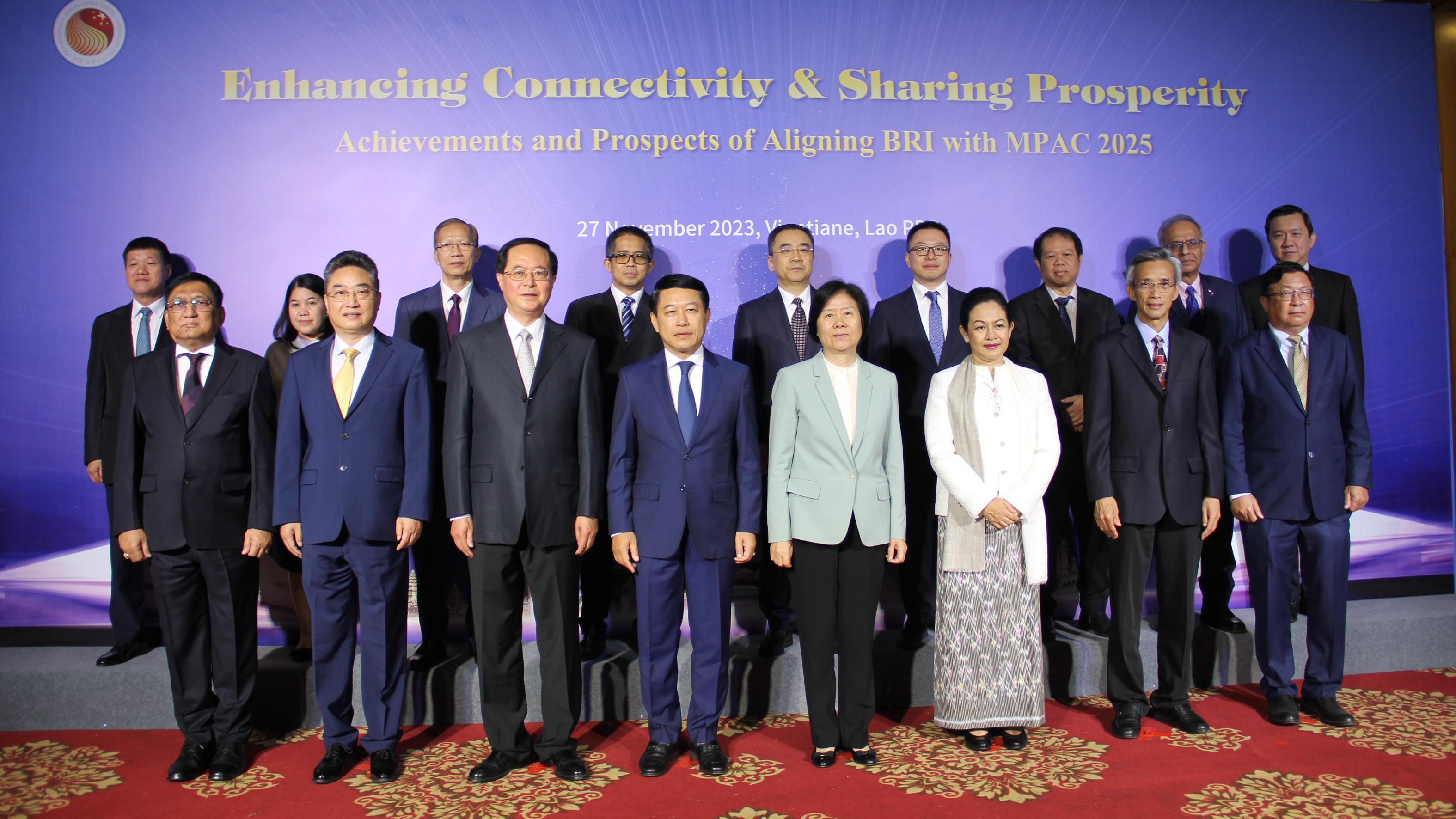 Officials from China and ASEAN gather at Vientiane, Laos' capital city, during the opening ceremony of a forum hosted by the ASEAN-China Centre themed "Enhancing Connectivity and Sharing Prosperity: Achievements and Prospects of Aligning BRI with MPAC 2025”on Nov 27, 2023. (PHOTO PROVIDED TO CHINA DAILY)
Officials from China and ASEAN gather at Vientiane, Laos' capital city, during the opening ceremony of a forum hosted by the ASEAN-China Centre themed "Enhancing Connectivity and Sharing Prosperity: Achievements and Prospects of Aligning BRI with MPAC 2025”on Nov 27, 2023. (PHOTO PROVIDED TO CHINA DAILY)
Officials from China and ASEAN said that the 10-year-old Belt and Road Initiative has yielded fruitful, tangible outcomes, and now is the time to look to green energy projects to maximize the initiative beyond connectivity.
These remarks were made on Monday in Vientiane, Laos’ capital city, during the opening ceremony of a forum hosted by the ASEAN-China Centre themed "Enhancing Connectivity and Sharing Prosperity: Achievements and Prospects of Aligning BRI with MPAC 2025”.
MPAC 2025, the Master Plan on ASEAN Connectivity 2025, was put forward by the 10 member states of ASEAN in 2016 to boost regional connectivity.
Speaking at the opening ceremony of the event, Saleumxay Kommasith, deputy prime minister and minister of foreign affairs of Laos, said the Belt and Road Initiative has made outstanding contributions to boosting regional connectivity, and has promoted economic and trade development, investment, personnel exchanges and economic and social development among ASEAN countries.
In 2024, Laos will be chair of ASEAN, as member states rotate the leadership role annually, based on alphabetical order of the English names of member states.
He said Laos has benefitted considerably from its China-Laos collaboration; it has “responded to the BRI and achieved tangible results”.
“Together with China, it implemented the China-Laos railway project, the Laos expressway project and the economic corridor project, which have made positive contributions to the strategy of ‘changing a landlocked country into a land-linked country’ in Laos,” he said.
Saleumxay added that over the past 10 years, the BRI has not only promoted regional development in areas such as infrastructure, interconnection, economic development, and investment cooperation but has also facilitated the adoption of advanced science and technology. He said it has promoted social and cultural exchanges, personnel exchanges, tourism development, and mutual understanding and trust among countries.
ALSO READ: HK can help lead the turbocharging of greener growth for ASEAN and GBA
The half-day forum comprised two sessions — “in retrospect on progress and achievement”, and “looking ahead with opportunities and challenges” — on the theme of “a decade of ASEAN-China connectivity”
Shen Yueyue, vice-chairperson of the National Committee of the Chinese People's Political Consultative Conference, said the successful completion of landmark projects, including the Jakarta-Bandung high-speed railway, Cambodia's Golden Port Expressway, and the China-Laos railway, have not only benefited the people residing along their routes but have also played a pivotal role in narrowing regional development gaps and promoting economic integration within the region.
Shen also highlighted the rapid development of China-ASEAN relations over the past decade, with trade volume expanding significantly and cumulative two-way investments having exceeded $380 billion by July this year.
In 2022, China-ASEAN trade exceeded $970 billion, up by 11.2 percent year-on-year. In 2013, that figure was $443.6 billion. ASEAN is also home to 6,500 Chinese companies.
She said she would welcome stronger collaboration in various fields, including youth, tourism, education, culture, and think tanks, to foster people-to-people connectivity and enhance friendly relations between China and ASEAN. The upcoming 2024 China-ASEAN Year of Cultural Exchanges was seen as an excellent opportunity to promote mutual understanding and cultural ties.
ALSO READ: Hong Kong to further drive GBA-ASEAN ties
Thet Thet Khine, union minister for Hotels and Tourism of Myanmar, emphasized the benefits of enhancing ASEAN connectivity through improved physical, institutional, and people-to-people linkages.
She highlighted the inauguration of the China-Laos railway, which served as a significant milestone in aligning MPAC 2025 with the BRI.
Khine also mentioned ongoing infrastructure projects, such as the Myanmar-Lao PDR Power interconnection projects, which further exemplify the commitment to connectivity.
Shi Zhongjun, the secretary general of the ASEAN-China Centre, discussed the importance of innovation, stressing the significance of green and low-carbon development for sustainable and high-quality economic growth in the region.
He highlighted the need for cooperation in areas such as green infrastructure, green energy, and green transportation, and said that effective dialogue mechanisms are being established to facilitate discussions between stakeholders in ASEAN and China regarding the application of smart technologies, the orderly and secure development of artificial intelligence, and other related topics.
The half-day forum comprised two sessions — “in retrospect on progress and achievement”, and “looking ahead with opportunities and challenges” — on the theme of “a decade of ASEAN-China connectivity”. A trade, investment and tourism promotional event of China-ASEAN was also held on Monday afternoon following the forum.
ALSO READ: China-ASEAN international media tour starts in Indonesia
Giving a speech at the first session, Myanmar's Deputy Foreign Minister Kyaw Myo Htut underscored Myanmar's dedication to cultural exchanges, personnel mobility, and vocational education. Myanmar has actively participated in joint education projects with other ASEAN member countries, while also focusing on digital connectivity, maritime interconnectivity, and the Maritime Silk Road.
Also speaking at the session, Guo Yanjun, director of the Institute of Asian Studies at China Foreign Affairs University, stressed the importance of taking a cooperative approach that balances security and development.
Recognizing the challenges posed by regional conflicts and competition among major powers, Guo emphasized the need for regional peace and collaboration in addressing issues like public health, climate change, food and energy security, and non-traditional security concerns, which are crucial to regional development and prosperity.


